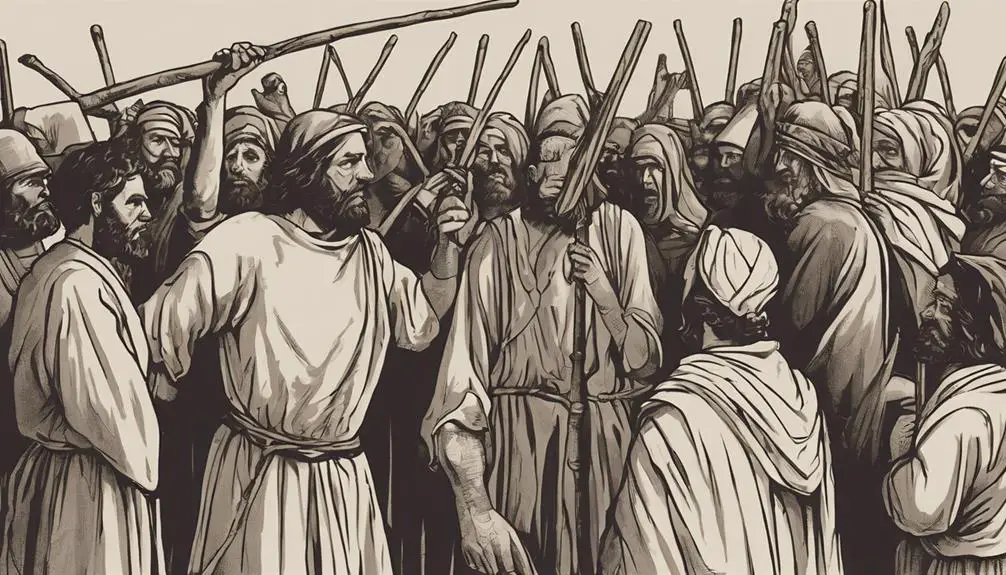Peek into the ancient practice of flogging in the Bible, a method steeped in legal, moral, and societal implications, awaiting deeper exploration.

What Is Flogging in the Bible
In the Bible, flogging wasn't just a hobby for the bored Roman soldiers; it was a deeply embedded societal and religious practice. You'll find that this form of punishment, mentioned in various scriptures, wasn't just for show. It carried significant weight in terms of legal and moral implications within the ancient communities.
As you explore the definitions, origins, and references within Biblical texts, you'll discover the multifaceted purposes flogging served. This journey into the past will not only shed light on its societal implications but also provoke thoughts on its modern interpretations.
So, why did societies consider this an effective method of discipline, and what can we learn from this today?
Key Takeaways
- Flogging in the Bible is a form of corporal punishment for correction and deterrence.
- Biblical references depict flogging within a structured legal and societal framework.
- It served multiple roles, including behavior correction, public deterrence, and religious purification.
- The practice reflects ancient societal values and sparks modern ethical debates on punishment.
Definition and Origins

Tracing its origins to ancient judicial and punitive practices, flogging in the Bible signifies a form of corporal punishment involving the beating or whipping of an individual. This method wasn't unique to the biblical context but was a widespread practice across various ancient civilizations. You'll find that ancient practices of flogging shared commonalities, yet they also bore significant differences when cultural comparisons are drawn.
For instance, in ancient Egypt, flogging was often used as a disciplinary measure, with the severity and method tailored to the social status of the offender. Similarly, in Greek and Roman societies, flogging served both as a punishment for slaves and as a judicial penalty for certain crimes. However, the Romans developed a particularly notorious reputation for their use of flogging, employing it as a precursor to crucifixion for the most severe offenses.
These cultural comparisons highlight the adaptability and pervasiveness of flogging as a punitive measure in ancient times. It's crucial to understand this broader historical and cultural context to fully grasp the significance and application of flogging in the biblical narrative, distinguishing it from later or contemporary interpretations of corporal punishment.
Biblical References
Numerous passages throughout the Bible illustrate the practice of flogging as a punitive measure, offering insight into its significance and application within the ancient judicial system. These references, embedded within both the Old and New Testaments, not only reflect the historical context in which they were written but also underscore the cultural significance of flogging in those times.
In the historical context, flogging was a widely accepted form of punishment, deeply ingrained in the societal and legal frameworks of the era. The Bible, in its capacity as both a religious and historical document, provides a window into how this practice was perceived and implemented. It's worth noting that the act of flogging wasn't arbitrary but was governed by specific laws and limitations, highlighting a structured approach to justice and punishment.
The cultural significance of flogging, as gleaned from these biblical references, extends beyond mere punishment. It serves as a testament to the societal values, norms, and legal principles of ancient civilizations. Understanding these references within their proper context is crucial for appreciating the multifaceted role flogging played in biblical times, beyond its immediate impact as a punitive measure.
Purposes of Flogging

Having explored the historical and cultural underpinnings of flogging in biblical times, it's essential to understand the specific purposes this practice served within those societies. Flogging, as found in various passages of the Bible, wasn't merely a form of punishment but played multifaceted roles in ancient communities. These purposes were deeply intertwined with the disciplinary measures and cultural contexts of the time. Here are three key reasons why flogging was employed:
- Correction of Behavior: Flogging was often used as a corrective tool. It aimed to deter individuals from committing offenses again by instilling a memorable consequence for their actions.
- Public Deterrence: Beyond impacting the individual, flogging served a communal purpose. Witnessing such disciplinary measures reinforced societal norms and discouraged others from engaging in similar misconduct.
- Religious Purification: In some instances, flogging was believed to have a purifying effect, cleansing the individual of their sins or wrongdoings in the eyes of the community and, by extension, before God.
Each of these purposes reflects how disciplinary practices, such as flogging, were nuanced and deeply embedded in the cultural contexts of biblical times.
Societal Implications
The implementation of flogging in ancient societies had profound implications on social structures and norms. This form of punishment wasn't just a means of correction but also a tool wielded to maintain order and communicate societal values. It's crucial to understand that cultural adaptation played a significant role in how flogging was perceived and implemented. Societies evolved their practices around flogging, shaping it to fit their changing norms and values. This flexibility in adaptation shows the complexity of integrating punitive measures within a culture's moral and social framework.
Furthermore, the use of flogging sparked ethical debates that echoed through the ages. These discussions weren't merely theoretical; they impacted the fabric of society by challenging existing norms and proposing new standards for justice and punishment. The debates around the ethics of flogging contributed to a broader discourse on human rights, dignity, and the limits of state power over individuals. As societies grappled with these questions, flogging became a focal point for examining the balance between communal security and individual rights, influencing legal and moral philosophies throughout history.
Modern Interpretations

Reflecting on the historical context and societal implications of flogging, it's now crucial to explore how modern interpretations have evolved, shedding light on contemporary views and applications of this practice. The discourse around flogging in the present day is heavily influenced by ethical debates and cultural relativism, presenting a complex landscape for understanding and engaging with this ancient form of punishment.
- Ethical Debates: Central to the modern interpretation of flogging is the ethical question of its use. Many argue that, in a world where human rights are increasingly prioritized, the practice of flogging as a form of punishment is inherently inhumane and degrading. This perspective often contrasts sharply with historical and biblical justifications.
- Cultural Relativism: The concept of cultural relativism plays a significant role in how flogging is viewed today. Some cultures may still see flogging as an acceptable, even necessary, form of discipline or justice, based on traditional beliefs and practices. This raises questions about the universality of human rights and the extent to which cultural practices should be respected or challenged.
- Contemporary Applications: Despite the controversies, certain regions and communities continue to employ flogging, often sparking international criticism and debate. These cases highlight the tension between upholding traditional values and conforming to modern human rights standards, illustrating the ongoing struggle to reconcile the past with present-day ethical frameworks.
Frequently Asked Questions
How Did the Flogging Practices of Ancient Israel Compare to Those of Neighboring Cultures in the Same Period?
When you compare the flogging practices of ancient Israel with those of neighboring cultures in the same period, you'll find significant differences in punishment methods.
Ancient Israel had strict limits on lashes, emphasizing rehabilitation rather than severe harm.
In contrast, other cultures mightn't have imposed such clear limits, leading to harsher treatments.
This cultural comparison reveals a nuanced approach to justice and punishment in ancient times, highlighting a distinct perspective within Israelite society.
Are There Any Documented Cases of Individuals Who Were Flogged and Later Became Influential Figures Within the Biblical Narratives or Early Christian Communities?
You're exploring whether individuals who were flogged emerged as influential in biblical narratives or early Christian communities, focusing on healing narratives and leadership styles.
Notably, Paul the Apostle was flogged and later played a pivotal role in spreading Christianity, shaping its theology and leadership approach.
His experiences, including flogging, influenced his teachings and leadership style, contributing significantly to the formation of early Christian communities and their healing narratives.
What Psychological Impacts Did Flogging Have on Both the Victims and the Societies That Practiced It, According to Historical or Biblical Insights?
Exploring the psychological impact of flogging, you'll find both victim resilience and society norms deeply intertwined. Victims often displayed remarkable psychological resilience, turning pain into a powerful testament of survival.
Conversely, societies that practiced flogging often reinforced norms of punishment and control, reflecting broader attitudes towards authority and discipline. This duality highlights the complexity of human endurance and the societal acceptance of suffering as a means of maintaining order.
How Have Different Christian Denominations Interpreted the Biblical Passages on Flogging, and Has This Affected Their Stance on Corporal Punishment Today?
You're exploring how Christian denominations have navigated biblical references to flogging. Modern interpretations and denominational doctrines vary greatly, reflecting diverse theological perspectives. This has significantly influenced their views on corporal punishment.
Some see it as aligned with biblical discipline, while others reject it, citing a more compassionate, reformative approach. These stances not only highlight theological diversity but also affect how congregations address and understand discipline within a contemporary context.
Can Any Parallels Be Drawn Between the Symbolic Significance of Flogging in the Bible and the Use of Suffering or Punishment in Other Religious Traditions?
You're diving into an ocean of wisdom when comparing suffering symbolism across religious traditions. It's fascinating to explore how different beliefs view punishment and suffering, not just as a consequence but as a transformative experience.
Interreligious comparisons reveal a rich tapestry of meanings behind suffering, from purification to enlightenment. This analytical journey showcases the universal role of suffering in spiritual growth, affirming its deep-rooted significance across diverse faiths.
Conclusion
In sum, flogging in the Bible emerges as a multi-layered practice, deeply intertwined with ancient societal norms and religious mandates. Envision the harsh whip's crack echoing through time, a vivid reminder of past disciplines and moral codes.
This ancient correction method, while stark, sheds light on the evolving nature of justice and punishment. Today's interpretations invite a reflective analysis, urging a deeper understanding of historical contexts and their ongoing influence on contemporary ethical frameworks.
Through scholarly exploration, the echoes of biblical flogging resonate, informing modern perspectives on justice and morality.



Sign up